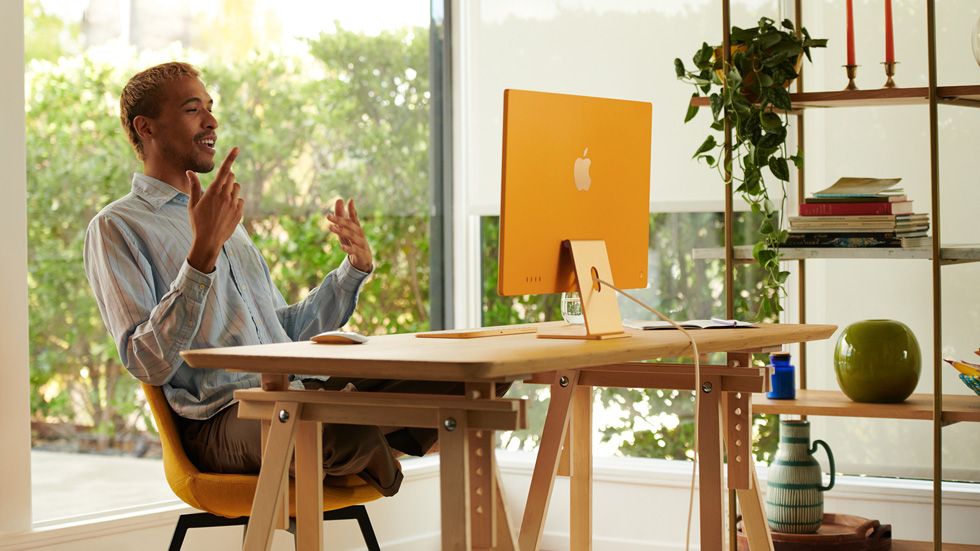As a creative professional, your tools are an extension of your craft. So the choice between the best laptops for graphic design and the best computers for graphic design can have a huge impact on your workflow, productivity and overall creative output. And it’s certainly not a decision you should take lightly.
On the surface, the differences are pretty obvious. Laptops enable you to work from almost anywhere, desktop computers don’t. The latter, on the other hand, typically offer fast processing, better cooling systems, and greater ability to upgrade components over time.
Once you start digging down into the nitty-gritty, though, things get a little more complicated. So in this article, we’ll break down the key factors to consider, so you can make an informed decision that aligns with your creative needs.
The main benefits of a desktop
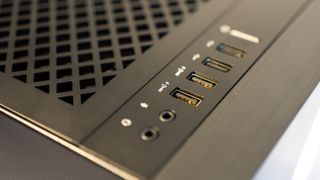
One of the main benefits of desktop computers is that they’re more powerful than your average laptop. A desktop doesn’t need to be ultra-portable, lightweight or thin, so this type of computer can pack in some seriously powerful processors, offer greater storage flexibility and can host some of the most advanced graphics cards out there.
Secondly, the customisation potential of a desktop computer is usually much better than with laptops, and you’re free to upgrade your hardware as you please, and overclock your graphics card.
For both of these reasons, desktops are typically favoured by gamers, as well as creatives working with resource-heavy software, such as the best photo editing software. Similarly, the best video editing computers are usually a better option for filmmakers, VFX professionals and 3D animators than a laptop.
A further benefit of desktops is that they tend to have more ports for connecting peripherals, whereas recently, laptops have been getting thinner, which generally means they have fewer ports and rely more on WiFi or Bluetooth for connectivity. Finally, as a general rule of thumb, a desktop can sometimes be cheaper overall than a laptop with similar specs. Keep in mind, though, that not all desktops have a display, so you’ll need to make space in the budget for one of the best 4K monitors.
The main benefits of a laptop
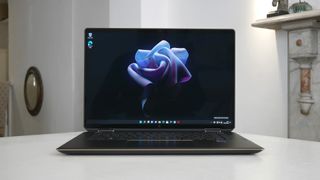
The most benefit of a laptop is its portability, allowing you to get work done on the go, at your local coffee shop… pretty much anywhere in fact. It also means you can move around the house with your device or do things like watch a movie in a hotel room.
Today’s extended battery power means that you don’t have to worry about being near a power socket for at least a few hours. And you don’t have to spend too much time getting set up either. Just open up the lid and you’re away. Furthermore, if you have a 2-in-1 laptop such as the HP Spectre x360 16 2-in-1, you can use it in different configurations such as tablet mode, laptop mode and tent mode.
All of this would be either impractical or impossible with most desktop computers. A desktop becomes pretty much set in stone once you choose where in your workspace to put it. So you need to make peace with the fact that your desktop is tied to one room, and choose carefully which room this will be. Does your broadband stretch far enough? Is the backdrop behind you suitable for business meetings? Can you get under your desktop to clean it?
That said, these considerations are changing a little with the latest generation of smaller devices. For instance, you could easily carry a Mac mini desktop from one room to another, or even take it into the office with you. That said, you’ll need to ensure that there’s a monitor waiting for you wherever you plan to go, so it’s still more cumbersome than using a laptop.
Other benefits of laptops over desktops include the fact that powering up is usually quicker with a laptop, and there are no annoying cables to get in your way. Also, the built-in webcam on most modern laptops is easy to angle for business meetings and typically includes a privacy slider for peace of mind.
Finally, while desktop computers are generally more powerful than laptops, some of the best MacBook Pro models, which feature the advanced M2, M3 and M4 chips, are powerful enough to compete.
Laptop vs desktop: productivity
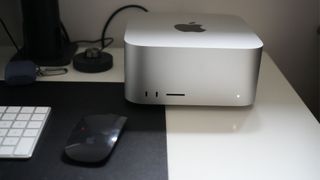
Productivity-wise, having a more defined office space that surrounds a desktop can help you to feel more “in the mood” for work mode, while using a laptop around the house can lead to easy distractions.
This makes a desktop the perfect choice for anyone who seeking better work/life balance. You won’t be tempted to scan new emails, for instance, while on the sofa or sitting at the breakfast bar in your kitchen.
Because time is money, the superior power of desktop computers may make them seem a better investment than laptops. Yet bear in mind that their running will probably be higher too. That’s because you’ll be using a lot of power if you work for extended hours, and this could potentially eat up your electricity bill.
To give you a sense of comparsion, large desktop and gaming computers are said to use between 200 and 500 watts of electricity on average, compared with only 30 to 70 watts for an average laptop.
Laptop vs desktop: Screen
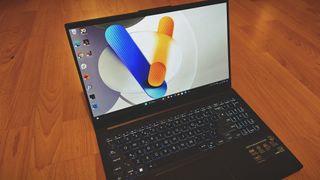
Many desktop computers don’t come with a screen, which means you might need to invest in one of the best monitors. Even if they do, it can be useful to have a dual monitor setup, depending on the extent of your workload and how you perform at your best.
In general, laptop screens are more susceptible to damage than a sturdy monitor display, given that they can get scratched easily by other items in your bag, be dropped, or knocked off a worktop or counter – especially if you’re the clumsy type.
Desktop displays can also be easier to calibrate, which helps you to ensure that what you see on your screen is exactly how your image or document will appear in print or on the web. While laptops like the ASUS Vivobook Pro 15 OLED (2024) are Pantone-certified for colour accuracy, nothing beats the satisfaction of viewing your work on a larger and high-resolution monitor or desktop display.
Laptop vs desktop: Connectivity
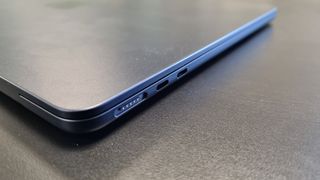
One major downside of owning a modern laptop is the sheer lack of ports and connectivity options they typically offer. There are plenty of models now that don’t even have an SD card slot or a headphone jack.
MacBooks and other modern ultra-thin laptops are especially limited in this regard. For example, with the MacBook Air (M2, 2022) you get just two Thunderbolt 3 (USB-C) ports, a 3.5mm headphone jack and a MagSafe 3 charging port: that’s your lot. So to connect a lot of peripherals, you’ll need one of the best docks for MacBook.
Laptop vs desktop: Price
When it comes to price, desktops often cost more than laptops, especially if you have to buy additional peripherals such as a monitor, mouse and keyboard. Yet they can still be the more affordable option for creatives in the long run, given how long that individual components can last for, and the option to reconfigure these parts as they run their course.
You don’t get that kind of sustainability with a laptop, where even high-end models will probably only last you around five years or so.
FAQs
Is it okay to use a laptop as a desktop computer?
There’s no reason you can’t install your laptop as a desktop computer, and many do. This allows you to connect it to a larger, external monitor, a more advanced keyboard, and a proper mouse, which you may find easier to use than your laptop’s trackpad.
Your setup will depend on the type of device you have and your specific needs. But typically, you’d need to buy a laptop dock, which will supply your laptop with power and provide extra ports for connecting up your peripherals. Some laptop docks also double as a laptop stand, if that’s what you’re looking for. Alternatively, if your laptop has Bluetooth, you may be able to connect your monitor, keyboard and mouse wirelessly instead.
Which lasts longer, a laptop or desktop computer?
Desktop computers generally last longer than laptops. A laptop’s lifespan is generally reckoned to be around three to five years, compared to a desktop computer’s lifespan of around five to eight years. However, in practice, how long either type lasts will vary hugely, depending on specific factors.
One will be the build quality of the original machine. Apple computers, for example, are broadly thought to be more robust and long-lasting than most, although you will pay more for them too. Another is how well you maintain your machine. Keeping computers free from dust and debris is vital, as well as regular cleaning and software upgrades.
If you tend to be clumsy, consider whether a laptop or desktop computer is more likely to get damaged in your presence. Laptops that you carry from place to place are likely to get dropped, of course, but if you habitually eat and drink at your desktop, that too may end up frazzled due to accidental spillages.
Either way, be aware that because of their compact design, laptops are generally more difficult to open up and repair when damaged than desktop computers.
Which is the best value, a laptop or desktop computer?
If you’re short of cash, desktop computers generally offer better value than laptops with similar specs. That’s because laptops are more expensive to produce, given – for example – the extra cooling technology they require to support their most compact design.
This is even more the case if you already have a computer monitor, keyboard and mouse to connect to a desktop computer, meaning you only need to buy the base unit.
Be aware, though, that desktop computers don’t always offer better value than a laptop: it’s very much a case-by-case basis.
